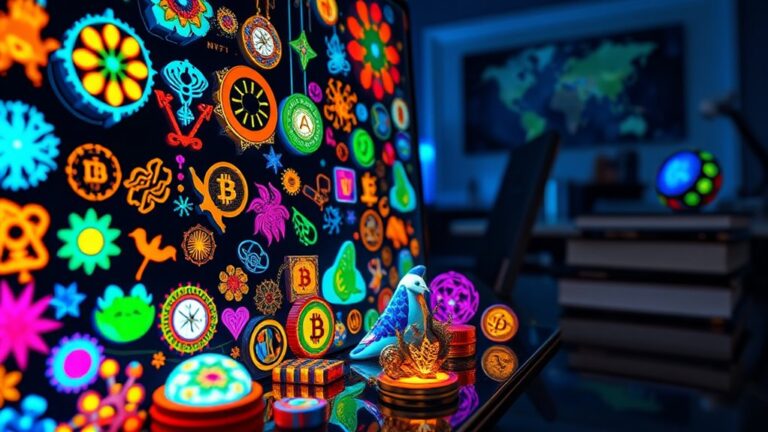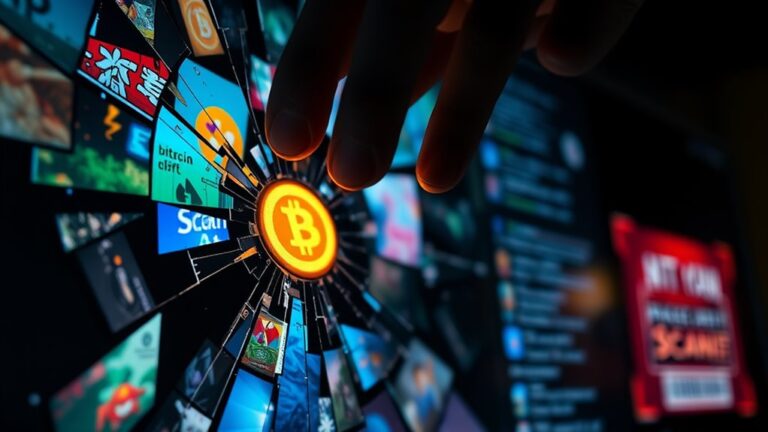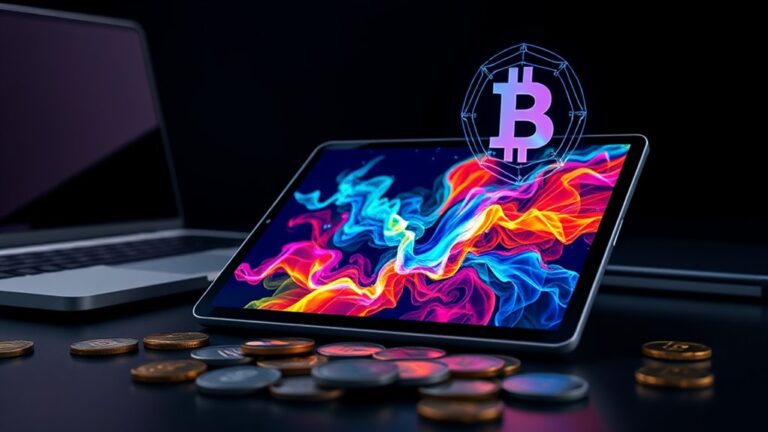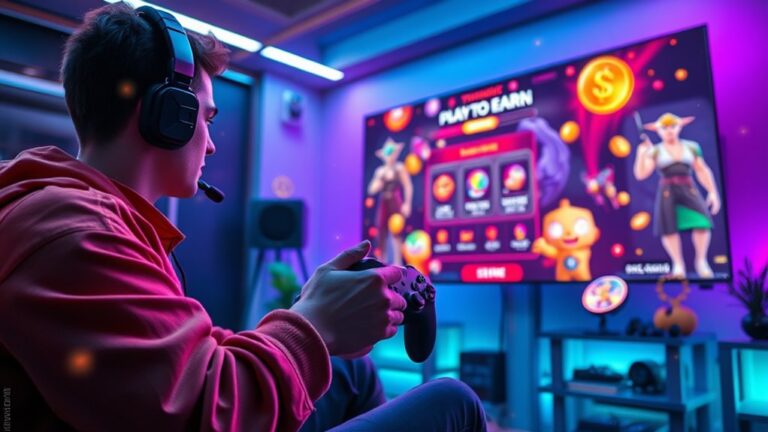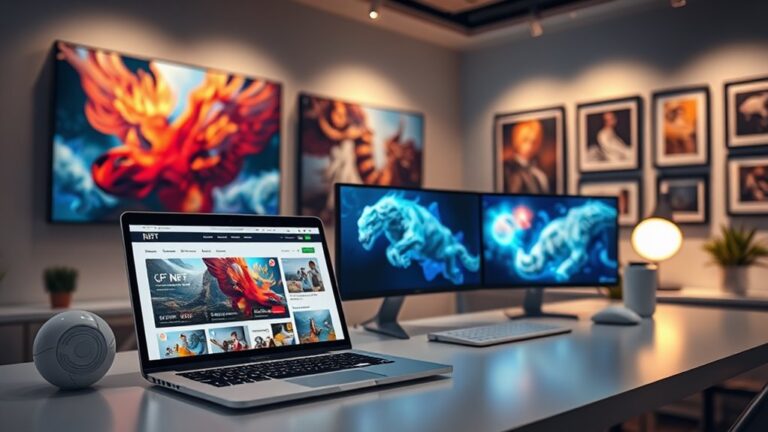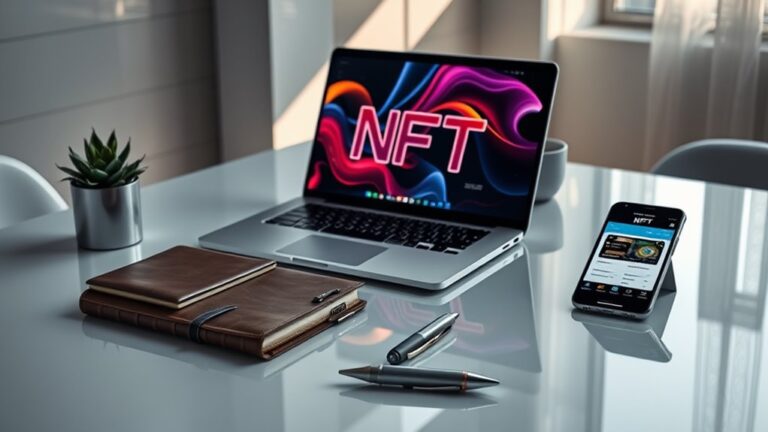
Music NFTs: Unlocking the Future of Digital Music Ownership
Music NFTs are unique digital tokens linked to music assets, using blockchain technology to prove ownership. They allow artists to sell directly to fans, increasing revenue and control. These tokens can reveal exclusive content, such as unreleased tracks and special events, enhancing fan engagement. The integration of smart contracts guarantees transparent payments, redefining music distribution. As the industry evolves, understanding these dynamics is essential for artists and fans alike. More insights on this topic await exploration.
Key Takeaways
- Music NFTs provide artists with direct sales opportunities, enhancing their revenue and reducing reliance on traditional streaming royalties.
- Blockchain technology ensures secure ownership and transparent transactions for music assets, revolutionizing music distribution and artist control.
- Fans gain exclusive access to unique content and experiences, fostering stronger connections and loyalty to artists.
- Music NFTs allow for innovative applications, including personalized experiences and decentralized distribution, altering traditional music consumption dynamics.
- Community engagement is crucial in music NFT ecosystems, enhancing trust and loyalty between artists and fans through active participation.
What Are Music NFTs?

Music NFTs represent a new frontier in the intersection of art and technology, offering unique digital tokens that are directly linked to music assets.
These tokens serve as proof of ownership, utilizing blockchain technology to guarantee that they cannot be forged or deleted. When a person owns a music NFT, they gain exclusive rights to the associated music asset, distinguishing this ownership from merely listening to a song.
These tokens ensure ownership authenticity, granting exclusive rights to music assets beyond just listening.
Music NFTs can encompass a variety of content, including single tracks, full albums, and even concert tickets. Often limited in supply, they provide varying degrees of exclusivity.
The creation process involves artists minting their music on blockchain networks, while fans can purchase these NFTs through specialized marketplaces, requiring digital wallets and cryptocurrency. Additionally, NFTs in music are enabling artists to sell music and royalties directly, ensuring equitable distribution of income.
The Benefits of Music NFTs for Artists

Music NFTs present several advantages for artists, primarily through direct revenue opportunities, enhanced creative control, and strengthened connections with fans.
By allowing artists to sell their work directly, these digital assets enable them to retain a larger share of revenue while also providing a platform for innovative releases and unique content.
Additionally, the relationship between artists and fans can deepen as NFT ownership creates exclusive experiences and fosters community engagement.
Direct Revenue Opportunities
Artists are discovering new ways to enhance their income through the innovative use of non-fungible tokens (NFTs). These digital assets provide unique revenue streams by allowing artists to sell directly to fans, eliminating the need for intermediaries like record labels.
This direct-to-fan model enables musicians to retain a larger share of their profits. In addition, limited-edition NFTs create a sense of scarcity and exclusivity, potentially increasing their value over time.
Successful artists, such as Steve Aoki and Snoop Dogg, have reported earnings from NFTs that surpass traditional music income. Moreover, NFTs reduce reliance on streaming royalties, providing a more stable and transparent financial landscape for artists, thanks to blockchain technology and smart contracts that guarantee proper payment for each sale.
Enhanced Creative Control
The rise of non-fungible tokens (NFTs) offers musicians a remarkable opportunity to enhance their creative control over their work. By utilizing NFTs, artists can retain full ownership of their music, bypassing traditional intermediaries like record labels.
This direct relationship allows them to sell music to fans while keeping a larger share of profits. Furthermore, blockchain technology guarantees authenticity and scarcity, which adds value to their creations.
Artists can also dictate the rarity of their NFTs, managing their catalogs effectively. This system empowers musicians to create and distribute music according to their vision, free from external pressures, while allowing them to offer exclusive content and experiences to their audience, enhancing their overall creative freedom. Additionally, the growing trend of utility-driven NFTs offers musicians the potential to provide unique rewards and governance rights to fans, further solidifying their connection with their audience.
Strengthened Fan Connections
As musicians explore innovative avenues to connect with their fans, the emergence of music NFTs presents a unique opportunity to foster deeper relationships.
By enabling direct transactions, artists can sell their music and experiences without intermediaries, allowing for greater profitability.
Music NFTs also provide fans with exclusive content, such as unique songs or concert tickets, creating memorable experiences that enhance loyalty.
Moreover, these digital assets can lead to community building, as fans gather around shared interests and exclusive events.
Additionally, fans may benefit from royalty sharing, offering a financial incentive tied to the artist’s success.
Through these mechanisms, music NFTs strengthen connections between artists and their audiences, promoting a more engaged and invested fan base. Furthermore, the integration of utility NFTs into the music industry may provide additional benefits, such as access to exclusive events or experiences, further enhancing the relationship between artists and their fans.
How Music NFTs Enhance Fan Engagement
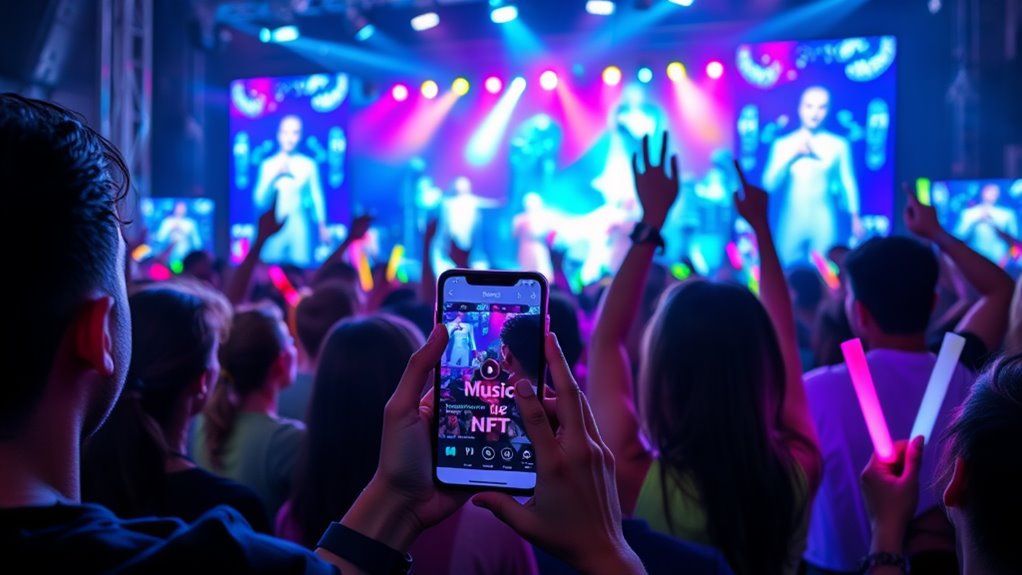
Music NFTs enhance fan engagement by offering exclusive content access, such as unreleased tracks and artwork.
This unique content fosters a deeper connection between artists and their fans, allowing for meaningful interactions.
Additionally, these digital assets create opportunities for community interaction, as fans can share experiences and connect over their shared interests in the artist’s work.
Exclusive Content Access
Enhancing fan engagement through exclusive content access has become a significant aspect of the music industry, particularly with the rise of NFTs.
Music NFTs provide fans with unique digital assets, including unreleased tracks and behind-the-scenes footage. These blockchain-based tokens guarantee secure ownership, allowing fans to feel a sense of exclusivity and direct connection to the artists.
Additionally, NFT ownership can grant access to special events like virtual meet-and-greets and limited live streams, further enhancing engagement. By participating in the ownership of these digital assets, fans not only invest financially but also become integral to an artist’s journey. This shift towards exclusive content fosters deeper relationships, encouraging fans to actively support and engage with their favorite musicians. Furthermore, just like Play-to-Earn models in gaming, music NFTs create new avenues for artists to monetize their work and grow their communities.
Community Interaction Opportunities
With the rise of NFTs in the music industry, opportunities for community interaction have expanded considerably.
Music NFTs create dynamic digital experiences that engage fans in new ways, allowing them to be active participants rather than passive listeners. Platforms like Itheum leverage Web3 technology to enhance fan engagement through exclusive ecosystems.
Fans can influence creative decisions, such as voting on track listings or participating in collaborative projects, while blockchain security guarantees that only verified NFT holders access unique content.
This decentralized model empowers artists and fans, fostering a direct relationship that enhances ownership and revenue streams.
Understanding Blockchain and Smart Contracts in Music
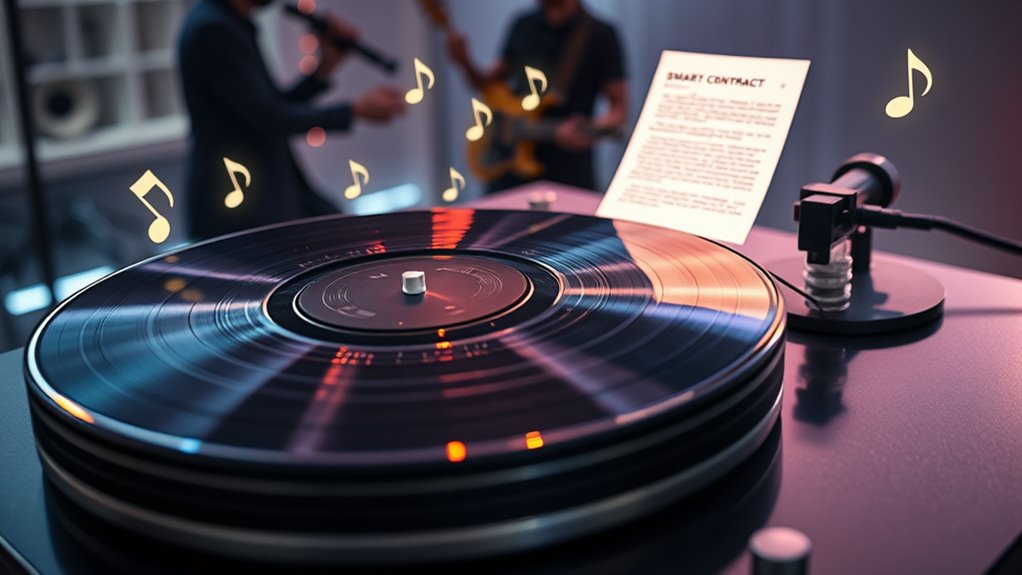
The emergence of blockchain technology is reshaping the landscape of the music industry by offering innovative solutions for artists and fans alike.
Key features of blockchain and smart contracts in music include:
- Decentralized Database: Blockchain acts as a secure, tamper-proof database for music distribution.
- Direct Artist Control: Artists can distribute their music directly, maintaining ownership without intermediaries.
- Security Against Piracy: The secure nature of blockchain reduces the risk of music piracy.
- Automated Royalty Payments: Smart contracts automate and expedite royalty distributions, ensuring fair compensation.
- Enhanced Fan Engagement: Smart contracts facilitate direct interactions, offering fans exclusive content and experiences.
These elements collectively enhance transparency, security, and the overall connection between artists and their audiences in the music industry. Furthermore, the integration of smart contracts allows for complex operations that can transform how music rights are managed and monetized.
Economic Impact of Music NFTs on the Industry
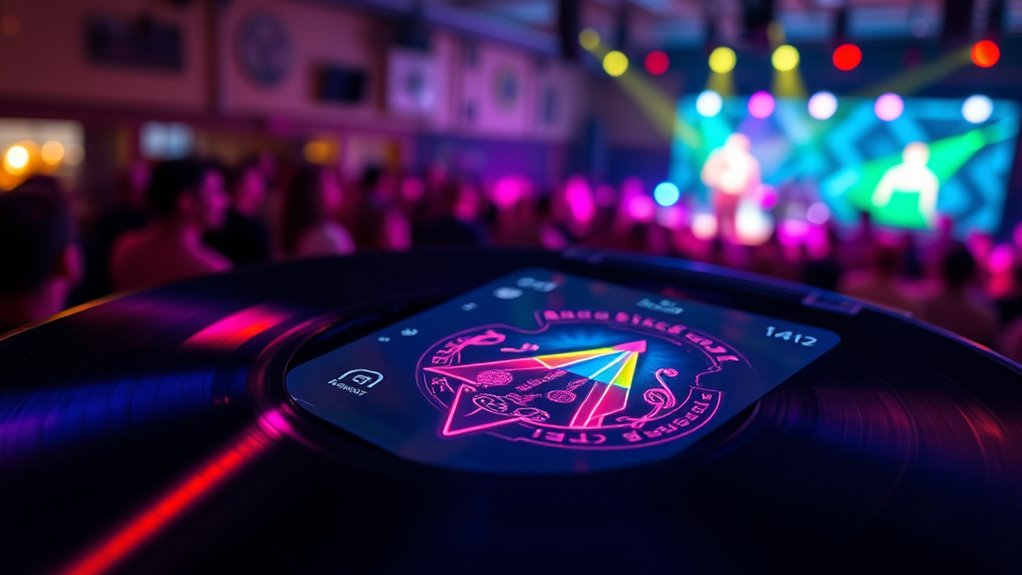
As music NFTs gain traction, they are transforming the economic landscape of the music industry, providing artists with unprecedented opportunities for financial independence. By facilitating direct-to-fan sales and bypassing traditional intermediaries, NFTs allow artists to retain a greater share of revenue. This economic shift empowers emerging musicians, offering alternative income sources and enabling automatic royalty payments through smart contracts. Additionally, the integration of cryptocurrency and blockchain enhances the security and transparency of transactions, further benefiting artists.
| Aspect | Impact |
|---|---|
| Control | Artists retain more ownership of their work |
| Revenue | Direct sales increase artist earnings |
| Community Engagement | Token-gated experiences foster fan loyalty |
| Market Dynamics | Disruption of traditional streaming models |
Innovative Uses of Music NFTs

Innovative uses of music NFTs are reshaping how artists engage with their fans and manage their creative output.
These digital assets create unique opportunities for interaction and investment, transforming traditional music consumption.
Key applications include:
- Exclusive Content Access: Fans can gain entry to unreleased tracks and behind-the-scenes content.
- Personalized Experiences: Artists can offer unique interactions, such as signed merchandise or meet-and-greets linked to NFT purchases.
- Direct Royalty Involvement: Fans can invest in songs and receive a share of royalties, fostering deeper connections.
- Decentralized Distribution: NFTs enable artists to distribute music directly to fans, circumventing intermediaries.
- Dynamic Music Development: Fans can influence the evolution of songs, contributing creatively to the music-making process.
These innovations enhance both fan engagement and artist autonomy.
The Role of Community in Music NFT Ecosystems
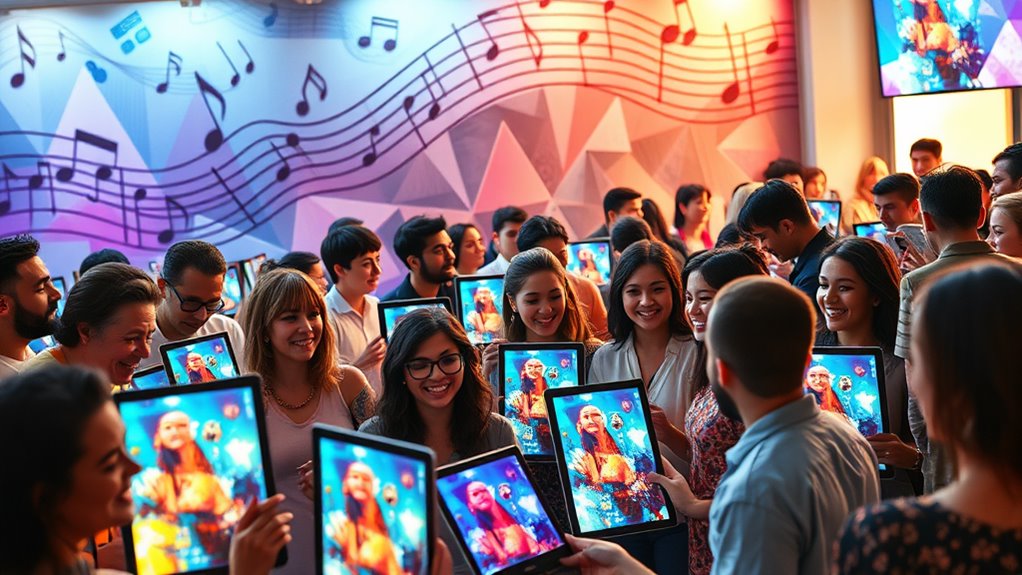
How do music NFTs foster a sense of community among artists and fans?
Music NFTs enable a dynamic interaction between creators and their audiences, transforming passive listeners into active participants. Through the use of blockchain technology, artists can engage directly with fans on platforms like Discord and Telegram, allowing for real-time feedback and communication. This direct interaction fosters loyalty and a sense of belonging among community members.
Additionally, NFT ownership provides fans exclusive access to content and experiences, enhancing their relationship with artists. The transparent nature of blockchain transactions builds trust, while smart contracts guarantee fair royalty distribution.
The Future of Music Distribution With NFTS
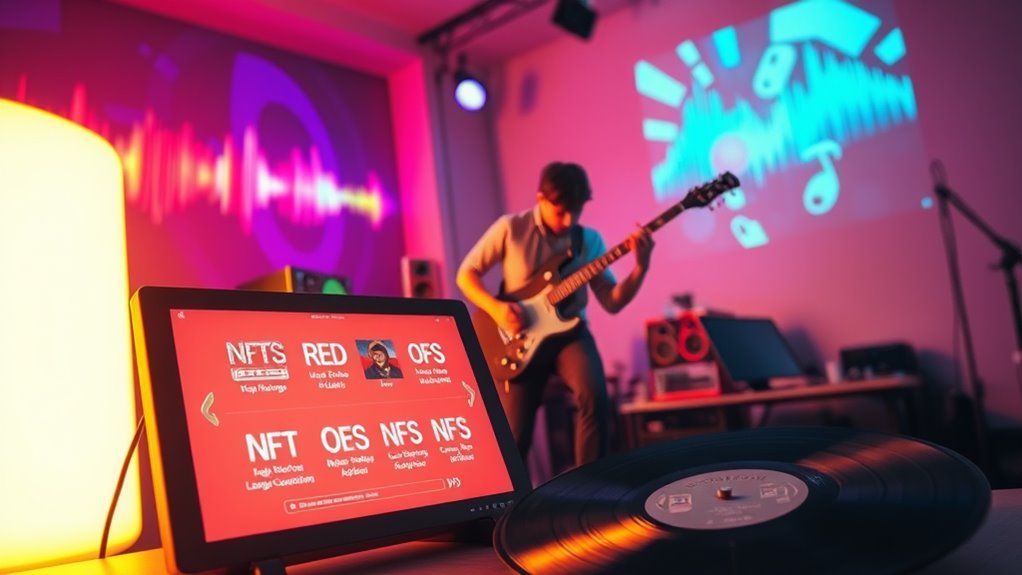
The future of music distribution is increasingly being shaped by the emergence of NFTs, which allow artists to connect directly with their audiences while bypassing traditional intermediaries.
This innovative approach is transforming the landscape of the music industry in several ways:
- Decentralized Distribution: Artists can distribute music straight to fans, eliminating record labels.
- Transparent Royalties: Smart contracts guarantee automatic and clear royalty payments, benefiting artists financially.
- Immutable Ownership: NFTs guarantee secure proof of ownership, protecting artists’ rights.
- Exclusive Experiences: Fans can purchase NFTs for unique content like concert tickets and meet-and-greets.
- Artist Control: Musicians retain full ownership of their work, unlike in conventional contracts.
These developments signify a shift towards a more artist-centric model in music distribution. Additionally, the integration of NFT royalties ensures that artists earn a percentage of future sales, providing them with ongoing revenue streams.
Challenges and Considerations for Artists
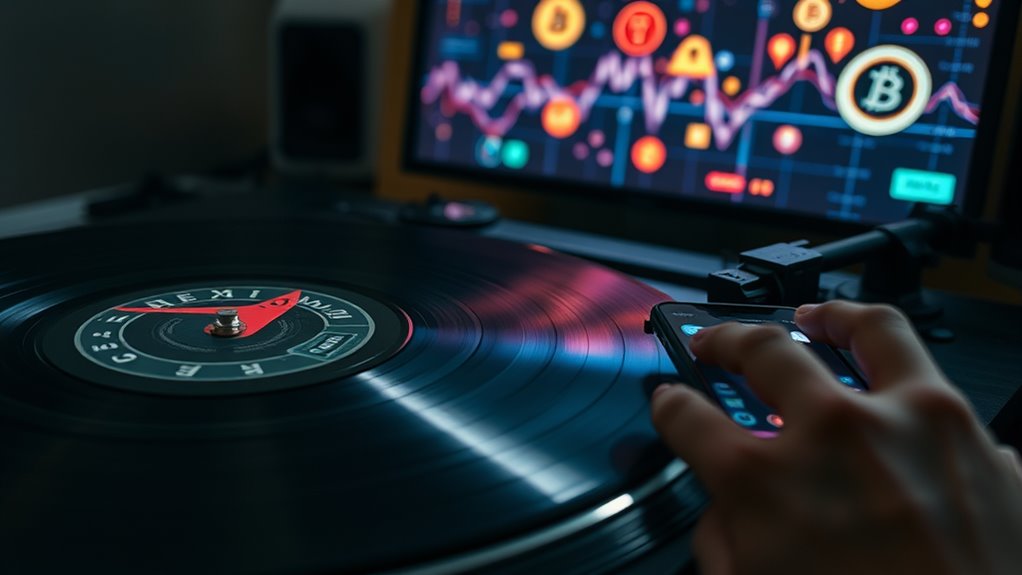
Artists entering the world of music NFTs face numerous challenges that can impact their success.
A significant concern is market saturation, as the increasing number of NFTs can make it difficult for individual artists to stand out.
Additionally, the technical knowledge required to create and manage these digital assets can be intimidating for those without a background in technology, potentially limiting participation in this evolving marketplace.
Market Saturation Risks
Steering through the challenges of market saturation presents significant risks for musicians entering the NFT space. As more artists create music NFTs, the supply can surpass demand, diminishing the perceived value of individual pieces.
This oversaturation can lead to several concerns for artists, including:
- Decreased demand for music NFTs, ultimately lowering their market value.
- Financial challenges, as artists may not earn anticipated revenue.
- Erosion of collector confidence due to market volatility.
- Limited exposure, making it harder for artists to reach new audiences.
- Increased competition, with numerous creators vying for attention.
These factors can hinder the potential for music NFTs as a sustainable monetization strategy, urging artists to explore unique approaches to stand out in a crowded market. Moreover, the environmental impact of NFTs, with substantial carbon emissions, adds another layer of complexity for artists considering their digital art’s long-term sustainability.
Technical Knowledge Requirements
Maneuvering the complexities of the music NFT market requires a solid grasp of various technical knowledge areas. Artists must understand blockchain technology, as NFTs are minted on these platforms. Familiarity with smart contracts is essential, as they automate transactions and protect ownership rights.
Additionally, managing a digital wallet is necessary for securely storing NFTs. Artists often rely on decentralized storage solutions, such as IPFS, to host their content. They should also be aware of various NFT platforms, each offering unique features and varying transaction fees.
Moreover, understanding copyright laws and licensing agreements is critical to avoid legal issues. Overall, acquiring this technical knowledge is indispensable for artists to successfully navigate the evolving landscape of music NFTs. Furthermore, comprehending the security and transparency offered by blockchain technology is vital for ensuring trust in the NFT marketplace.
How to Get Started With Music NFTS
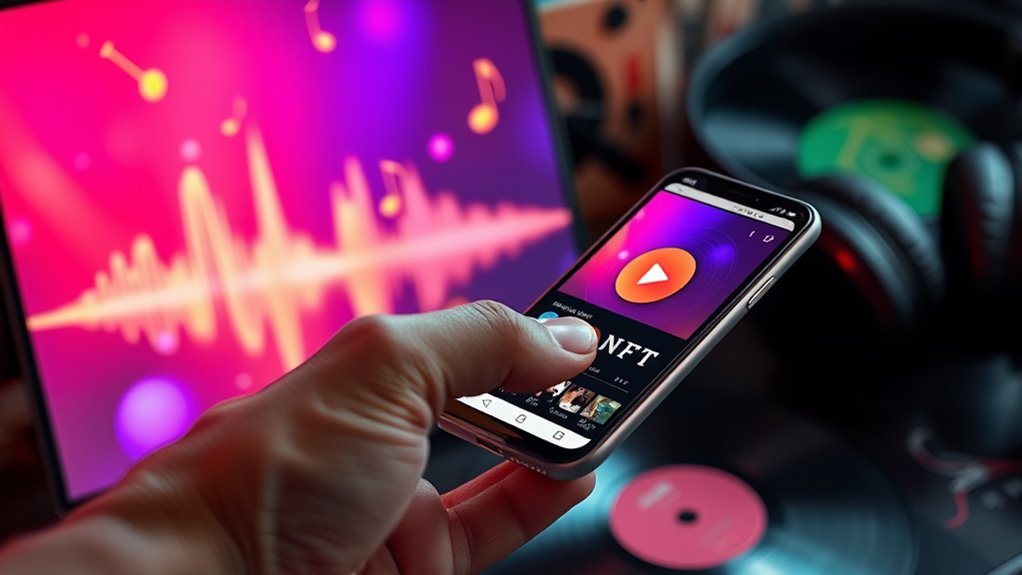
Getting started with music NFTs can seem complex, but with a clear understanding of the necessary steps, anyone can navigate this innovative space.
To enter the world of music NFTs, one should consider the following steps:
- Create Music: Produce a song or album that you wish to mint as an NFT.
- Choose a Blockchain: Select a blockchain like Ethereum or Polygon for minting.
- Mint the NFT: Convert your music into a blockchain-based NFT through a minting process.
- Set Up Smart Contracts: Configure contracts to manage ownership and royalties effectively.
- List on Marketplaces: Make your NFT available on platforms such as Catalog or Sound.xyz for fans to purchase.
With these steps, artists can successfully engage with the music NFT market.
Frequently Asked Questions
How Do I Create My Own Music NFT?
To create a music NFT, one must select a blockchain, set up a digital wallet, mint the audio file and artwork on an NFT marketplace, and define metadata and royalties before listing for sale.
What Platforms Are Best for Buying Music NFTS?
When considering music NFT platforms, one finds a spectrum of choices. OpenSea offers broad access, while Rarible emphasizes decentralization. Each platform, like SuperRare and Nifty Gateway, uniquely enhances user experience and community engagement.
Can Music NFTS Be Resold?
Music NFTs can indeed be resold. They represent unique digital assets, allowing ownership transfer while enabling original creators to receive automatic royalty payments through smart contracts during each resale, ensuring transparency and fair compensation.
Are There Environmental Concerns With Music NFTS?
Environmental concerns surrounding NFTs stem from their high energy consumption and substantial carbon footprint. Critics emphasize the need for sustainable practices, while innovations like proof of stake and carbon offset programs aim to mitigate these impacts.
How Do Royalties Work for Music NFTS?
In the domain of digital creativity, music NFTs employ smart contracts to automate royalty payments, ensuring transparency and ongoing income for creators. These contracts dictate percentages, providing a sustainable revenue stream even through secondary market sales.
Conclusion
In conclusion, music NFTs represent a transformative shift in digital music ownership, offering artists new revenue streams and fostering deeper connections with fans. By leveraging blockchain technology, musicians can guarantee transparency and control over their work. However, challenges remain, requiring careful consideration. As the landscape of music distribution evolves, the potential for innovation is as vast as an open sea, inviting artists and fans alike to explore uncharted waters in the digital domain.


